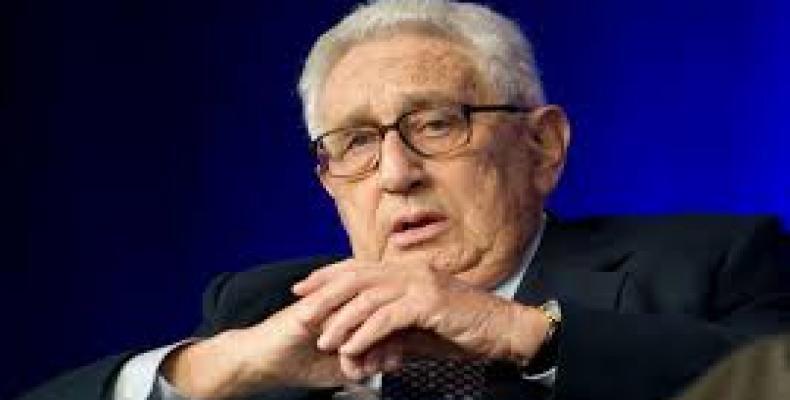Washington, August 10 (RHC)-- As Hillary Clinton attempts to seal Henry Kissinger's endorsement, documents reveal how he undermined Jimmy Carter's human rights agenda in Argentina.
In a much-awaited step toward uncovering the historical truth of the U.S.-backed Dirty War in Argentina in the 1970’s and 80’s, the United States has delivered over 1,000 pages of classified documents to the South American country. But critics argue that there are major gaps in the files, including the exclusion of CIA documents, that keep in the dark important details of the extent of human rights violations and the U.S. role in such abuses.
The Argentinean government delivered the newly-declassified documents to journalists and human rights organizations after U.S. Secretary of State John Kerry presented the files to President Mauricio Macri during a state visit last week.
The 1,078 pages from 14 U.S. government agencies and departments are the first in a series of public releases over the next 18 months of declassified documents related to Argentina’s last military dictatorship, including Argentinean Country Files, White House staff files, correspondence cables, and other archives, according to a statement from the U.S. Office of the Director of National Intelligence.
The files include grisly descriptions of torture, rape, assassinations, and forced disappearances carried out by the military regime under General Jorge Rafael Videla, installed after the 1976 coup against left-wing President Isabel Peron.
The documents also detail Henry Kissinger’s applause of the Argentine dictatorship and its counterinsurgency strategy, including during a visit to General Videla during the 1978 World Cup. National Security staffer Robert Pastor wrote in 1978 that Kissinger's “praise for the Argentinean government in its campaign against terrorism was the music the Argentine government was longing to hear.”
Argentina’s so-called anti-terrorism policy was in reality a brutal crackdown on political dissidents, human rights defenders, academics, church leaders, students, and other opponents of the right-wing regime. It was also part of the regional U.S.-backed Operation Condor, a state terror operation that carried out assassinations and disappearances in support of Sout America's right-wing dictatorships. In Argentina, up to 30,000 people were forcibly disappeared during the Dirty War.
The documents also detail how then-U.S. President Jimmy Carter raised concern over the human rights situation in Argentina, including in a letter to General Videla rather gently urging him to make progress with respect to human rights. At the time, Kissinger reportedly demonstrates a “desire to speak out against the Carter Administration's human rights policy to Latin America,” according to a memo by National Security’s Pastor.
The further confirmation of Kissinger's atrocious legacy in Latin America comes as U.S. presidential hopeful Hillary Clinton courts an endorsement from Kissinger, widely condemned as a war criminal by human rights groups.
However, despite the revealing details, the batch of documents is also lacking in key archives, the Argentine publication El Destape pointed out. The package does not include files from the CIA or the Defense Intelligence Agency, which specializes in military intelligence.
What’s more, although the documents were expected to cover the period of 1977 to 1982, the latest documents are dated 1981, which means that cables related to the 1982 Malvinas War between Argentina and Britain and the U.S. role in the conflict are not included.
The Macri administration hailed the release of the documents as the result of a “new foreign policy” that has steered the country to rekindle ties with the United States after former Presidents Nestor Kirchner and Cristina Fernandez championed anti-imperialist politics for 12 years. But the self-congratulatory government narrative ignores the fact that Argentine human rights organizations have demanded for years that the archives be released in a fight for historical truth that first bore fruit in 2002 with the release of over 4,500 U.S. documents. Furthermore, Macri has come under fire for undermining investigations into dictatorship-era crimes after his sweeping austerity campaign scrapped departments charged with gathering historical evidence in certain public institutions. The Argentine president has also been criticized over his indirect ties to the military regime, which proved to hugely benefit his family business, the Macri Society, also known as Socma.
U.S. President Obama described the move as a response to the U.S. “responsibility to confront the past with honesty and transparency.” Obama announced plans to release documents related to the Dirty War during a visit with Macri in Argentina in March, which coincided with the 40th anniversary of the 1976 military coup.
Obama’s visit was widely criticized by human rights activists over the insensitivity of the timing. Although he announced plans for the United States to “do its part” with respect to uncovering historical truth about the dictatorship period, he did not apologize for the United States’ involvement in human rights abuses and widespread forced disappearance.


